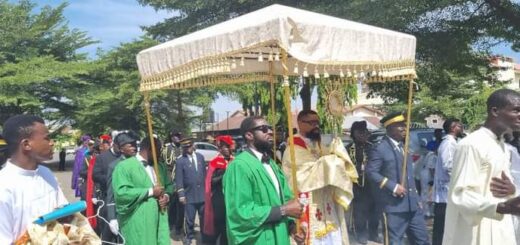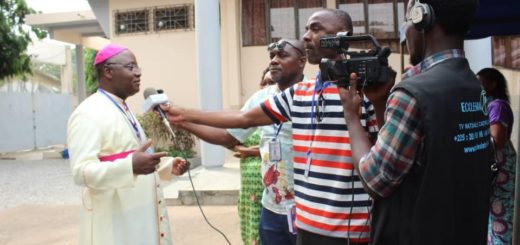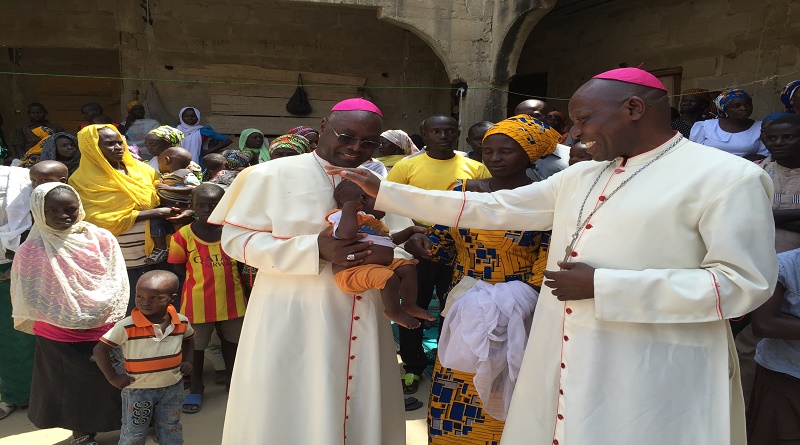Mission to Preach and the Imperative of Personal Change
by ARCH BISHOP · January 24, 2021
Third Sunday, Year B, Homily by Archbishop I. A. Kaigama, St. Francis Parish, Pegi, January 24, 2021.
Readings: Jonah: 3:1-5, 10; Ps. 24(25):4-6, 7-9; 1 Cor. 7:29-31; Mk 1:14-20
The Holy Father, Pope Francis, in his Apostolic Letter, Aperuit illis, directed that the 3rd Sunday in Ordinary Time is to be observed as “Sunday of the Word of God,” and devoted to the celebration, study and dissemination of the Word of God. We are therefore called to own, study, celebrate, live and share the Word of God, “a lamp to our feet and a light unto our path” (Ps. 119:105). At this Mass, the Word of God has been enthroned in front of the altar, thereby calling to mind its importance in the lives of Christ’s faithful. As we listen to God’s Word today, may we find healing, grace, peace and answers to our prayers.
MISSION TO PREACH AND THE IMPERATIVE OF PERSONAL CHANGE
The first reading tells us about the reluctant Jonah who was sent on a mission to preach to the city of Nineveh, notorious for its lack of morals, idolatrous and decadent lifestyle of its inhabitants. His preaching bore fruits because the people listened to God’s Word and attracted God’s mercy. From the least to the greatest, they all repented by fasting (including their animals); they put on sack clothes, and sat down in ashes. God saw their remorse and penitence and did not allow the punishment He had intended on them.
In our second reading, St. Paul urged the community in Corinth not to lose time in accepting the Gospel message because of the unpredictable second coming of Jesus; to detach themselves from the pleasures of life that distract them from the vision of heavenly things, as “the appointed time is very short” (1 Cor. 7:29) and “the form of this world is passing away” (1 Cor. 7:31).
MESSAGE OF THE KINGDOM
In the Gospel, Jesus inaugurates the beginning of His public ministry with the announcement of the fulfilment of God’s promises and the call to repentance: “The time has come, the kingdom of God is at hand, repent and believe the Good News” (Mk. 1:15). Jesus recruited Simon, Andrew, James, John and the other Apostles to join Him in His preaching ministry.
The kingdom of God consists of righteousness, peace and joy in the Holy Spirit (cf. Rm. 14:17). To be part of this kingdom, we need to repent of our sins and those things that are not in line with the will of God. It also means being able to let go of our materialistic mentality, like the person who discovers a treasure hidden in the field and goes home and sells everything in order to possess it (cf. Mt. 13:44-46) or like Peter, Andrew, James and John, to be ready to sacrifice everything for the kingdom of God.
THE WORD OF GOD SHOULD UNITE, NOT DIVIDE CHRISTIANS
This Sunday marks the end of our week-long prayer for Christian unity in the Federal Capital Territory (FCT), from 17th – 24th January, with the theme: “Abide in my love and you shall bear much fruits” (cf. Jn. 15:5-9). For one week we have been visiting different churches and praying in solidarity with Christians of other denominations, asking God for unity among Christians and peace and security in our nation. We started from the Ecumenical Centre, Abuja, moved to the Foursquare Gospel Church, then to the Cherubim and Seraphim Church, the Baptist Church, back to the Ecumenical Centre, then to the Catholic Pro-Cathedral, the ECWA Church and ending at the Ecumenical Centre. In our diversity, we have one God, the Father from whom all things came and for whom we live (cf. 1 Cor. 8:6). We need to break down the mountains of age-old prejudices and antagonisms against one another. I thank the Chairman of the Christian Association of Nigeria (CAN) in the FCT, Rev. Dr. Samson Jonah, and our dynamic and energetic Rev. Fr. Robert Achiaga, the Chairman of the Ecumenical Commission of our Archdiocese, for working for the success of the maiden event. It is my sincere hope that the fruits of this spiritual exercise will foster greater unity among Christians both here in the FCT and in Nigeria, and indeed in the world at large. We must continue to show openness to dialogue and cooperation with one another as Jesus desires in John 17:21, that we may all be one.
THE SENSES OF SCRIPTURE
As we Christians use the Bible, let us be careful to note its interpretation so as not to allow a faulty understanding of it to lead us to fanatical conclusions or practices. The outcome of listening to the Word of God is obedience and repentance, as the people did in Joshua 24:24 saying, “We will serve the Lord, our God, and obey his voice”; while those who listened to Ezra the priest reading from the book of the Law wept on account of their sins (cf. Neh. 8). In the New Testament the soldiers, tax collectors and prostitutes all sought repentance after hearing the Word of God.
We are encouraged to use the Bible for meditation and prayer, Lectio Divina, but we must realize that we don’t all become experts in interpreting the Bible without the relevant biblical studies. As we read the Scripture, the Catechism of the Catholic Church #115 reminds us to distinguish the literal sense (the text as it needs to be understood), and the spiritual sense which is subdivided into the moral sense (how Christ desires His disciples to act), the allegorical sense (stories that point to Christ, e.g. the crossing of the Red Sea), the anagogical sense (it relates events in terms of their eternal significance – death, final judgment, hell and heaven).
CONCLUSION
In conclusion, I encourage those receiving confirmation today to sustain their renewed life of grace by an ardent love for God and strong Christian witness (cf. Vatican II, Apostolicam Actuositatem #3). We, the baptized, are called to preach the Word of God in deed and in words, namely, to preach the message of repentance in our world of sin and darkness. We must not allow the terrible vices of the world shut down our voice or dampen our spirit.




